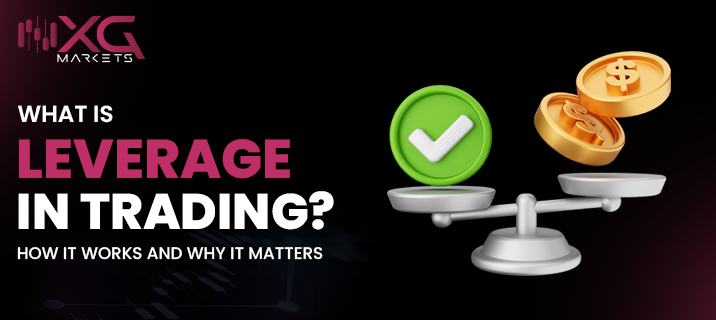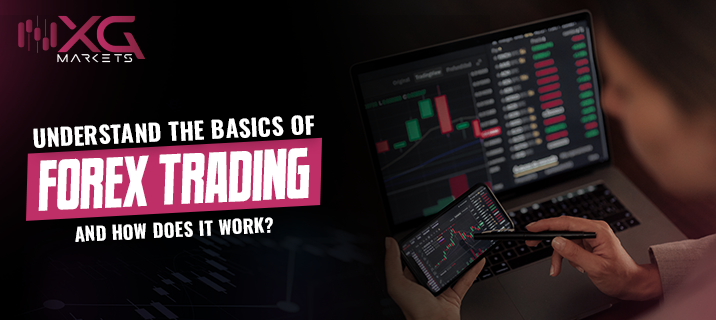
What is Leverage in Trading? How It Works and Why It Matters
Aug 27, 2025 12:00 amMost traders don't lose because they're careless. They lose because they misunderstand leverage.
Why is it so?
In this article, we will explore the concept of leverage in trading, and how this is being misused.
Financial trading rewards and punishes with equal force. Many traders lose money by misusing leverage, seeing it as a shortcut to wealth, when it's often a fast track to losses. If traders use leverage wisely, they can control risk, but misusing it means risk controls them.
What is Leverage in Trading?
Let’s understand what leverage is in trading. Leverage allows traders to control larger market positions with smaller amounts of capital. It acts as a financial amplifier, making profits and losses bigger in the same way.
Let's understand with an example.
A trader has $10,000 and wants to buy shares priced at $100 each. Without leverage, they can buy 100 shares (10,000 ÷ 100).
With 1:10 leverage, the trader can control 1,000 shares worth $100,000 while only using $10,000 of their own capital.
If the market price advances from $100 to $110
- The unleveraged position gains $1,000 (a $10 increase × 100 shares), which is a 10% return on their $10,000 capital.
- The leveraged position gains $10,000 (a $10 increase × 1,000 shares), which corresponds to a 100% return on the $10,000 invested.
However, leverage also amplifies losses. If the share price drops from £100 to £90:
- The unleveraged trader loses £1,000 (a £10 decrease × 100 shares).
- The leveraged trader loses £10,000 (a £10 decrease × 1,000 shares), which means their entire £10,000 account balance is wiped out.
Leverage serves as both an opportunity and a threat in modern trading. When applied correctly, leverage amplifies profitable trades and accelerates account growth. When misapplied, it destroys capital before traders can react.
The difference lies not in avoiding leverage altogether. The difference lies in understanding its mechanics and implementing proper risk management strategies.
Before applying leverage, it’s wise to revisit the Basics of Forex Trading for Beginners to build a strong foundation in market mechanics.
Why Do Traders Misuse Leverage?
Most beginners see leverage as "free money." They focus on the profit side and ignore the risk side. A 50-pip move in your favour looks exciting. The same 50 pips against you? That wipes out your account.
Here are the common reasons traders misuse leverage:
- Lack of risk awareness: New traders often fail to calculate the value of a single pip.
- Greed for faster gains: The temptation of turning a small account into a big one overnight.
- Poor risk management: No stop-loss, oversized positions, and ignoring percentage-based risk.
- Broker marketing: Many brokers advertise leverage as a "benefit," but rarely explain how destructive it can be.
The Hidden Risk of High Leverage
Think about it this way: leverage is like driving a car.
- 10x leverage = a scooter at normal speed.
- 50x leverage = a car at highway speed.
- 500x leverage is like a race car at maximum speed.
A small bump on the road becomes deadly. In trading, a small market move can wipe you out completely. Therefore, it is essential to use leverage the right way
How to Use Leverage the Right Way
Professional traders use leverage cautiously. They don't see it as a way to gamble but as a tool to maintain flexibility. They manage the risk effectively. Let us understand Risk Management in Leverage.
Risk Management: The Foundation of Sustainable Trading
Position Sizing
Never risk more than 2% of trading capital per position.
Suppose you have $50,000 and risk a maximum of $1,000 per trade. If your stop-loss is $5 per share, buy a maximum of 200 shares.
This rule applies regardless of confidence levels.
Diversification
Limit each position to 5-10% of the total account value.
Trade different markets. Use different timeframes. Never put all eggs in one basket.
Emotional Discipline
Fear and greed destroy more accounts than bad analysis.
Write trading rules when calm. Follow them when stressed.
Professional traders view losses as business expenses, not personal failures.
Common Mistakes Traders Make with Leverage
- Treating leverage as free money is common.
- Ignoring stop-loss orders. One bad trade without protection can erase weeks of gains.
- Overconfidence in winning streaks. Traders often increase leverage after small wins, leading to account blowouts.
- Misunderstanding margin calls.
- When margin levels fall short, brokers execute forced sell-offs at the most inconvenient moments..
Most traders don't fail because they lack skill. They fail because they treat leverage like free money instead of disciplined borrowing. Leverage is not your enemy, it's your amplifier. It will magnify your strengths if you respect it. It will magnify your weaknesses if you ignore it.
For long-term success in trading, remember: Your misuse of leverage beats you, not the market.
Choosing the Best Forex Broker for Leverage
The role of the broker is critical. A top forex broker provides good leverage, reliable regulation, and clear prices.
When evaluating brokers:
- Check the maximum leverage allowed in your region.
- Confirm margin requirements and stop-out levels.
- Ensure the broker offers reliable execution for market and limit orders.
- Seek features like negative balance protection.
NXG Markets gives traders flexible leverage and advanced order types to help manage risk.
Beyond forex, many traders also explore futures and commodities. Selecting the Right Brokers for Futures Trading and Commodities is just as important for managing leverage and ensuring transparent execution.
Actionable Takeaways for Traders
- Understand what leverage in trading is before applying it.
- Start small, test different leverage ratios in demo accounts.
- Use order types strategically, not randomly.
- Focus on capital preservation, not just profit potential.
- Treat leverage as a tool for disciplined execution, not speculation.
Conclusion: Mastering Leverage with Order Discipline
Leverage is neither the hero nor the villain of trading, it is the magnifier in booth profits and losses. It can open up opportunities if you use it wisely, stay disciplined, and manage things well. Opportunities are usually out of reach. It can shut them with equal speed, if carelessly utilized.
The variations stem from education, experience, and risk management. When you understand leverage and how to place trades, you acquire control of the most essential thing in the market: your own choices.
Frequently Asked Questions
1. What is leverage in trading?
Leverage allows traders to control larger market positions with smaller amounts of capital. It acts as a financial amplifier, making profits and losses bigger in the same way.
2. What are common leverage ratios?
Forex markets widely offer 1:50, 1:100, and 1:500.
3. How do trading orders help manage leverage?
Orders like stop-loss and limit orders help cap risk and lock in profits while using leverage.
4. Can leverage wipe out my account?
Yes, High leverage magnifies losses, so poor risk management can quickly drain capital.
5. How do I choose the best forex broker?
Look for regulated brokers that offer flexible leverage, transparent execution, and strong risk protection features.

.png)



